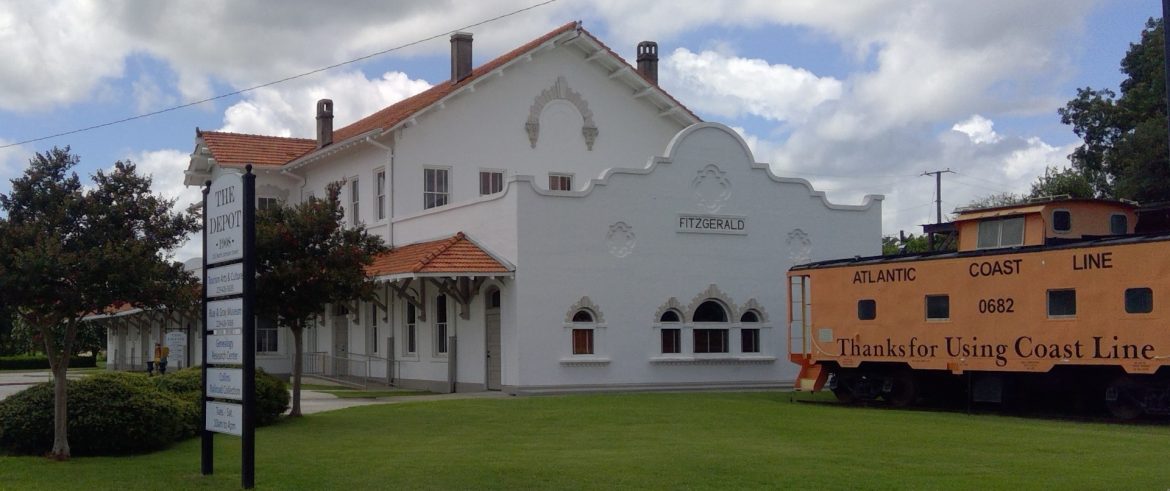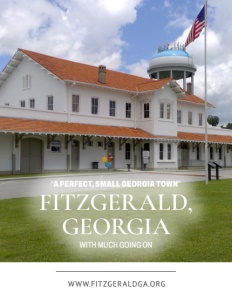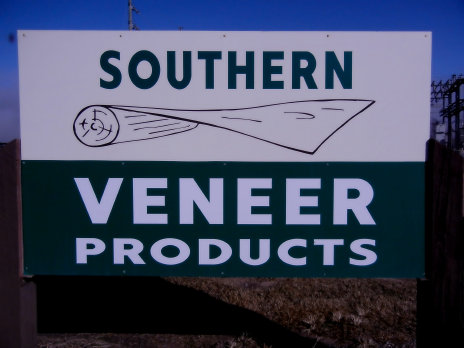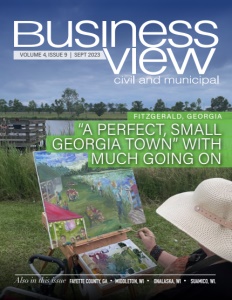Fitzgerald, Georgia
“A perfect, small Georgia town” with much going on
Combining its historic appeal with innovative economic initiatives, Fitzgerald, Georgia is much more than a southern gem
The motto of the charming town of Fitzgerald, Georgia-“History, Harmony, and Heritage” sums up the perfect blend of tradition and progress that the town exudes. A tight-knit community of some 10,000 folks that is situated some three hours west of Savannah, Fitzgerald, named for its founder P.H. Fitzgerald was founded shortly after the American Civil War as a retirement community for civil war veterans. Still to this day and true to the founders’ wishes, street names honoring both Union and Confederate generals exist.
We recently spoke with Fitzgerald Mayor Jason Holt, city administrator Kathy Young and executive director Jason Dunn of the Fitzgerald and Ben Hill County Development Authority. They told us all about what Holt calls “a perfect, small Georgia town.”
Fitzgerald, says the mayor, “really gets overlooked (despite) what we’ve been able to do in the industrial sector with manufacturing and food production. It’s a hidden gem that reached a height in the late ’60s and early ’70s with recreational vehicle manufacturing and automotive battery manufacturing. As industries do, they kind of ran their course. We took a hit in the downturn of the early 2000s, but we have really come back, thanks to the efforts of a lot of folks.”
Holt, also a funeral director and a life insurance agent, adds that the city is now coming back in terms of manufacturing, though it can get overlooked because of its location. That location can be quite pleasant, as the mayor describes a community of many Georgia pines and lots of opportunities for hunting, fishing, and boating.
Dunn extols the centrality of Fitzgerald’s location.
This, he adds, “allows us to experience most of Georgia in a short drive or most of
Georgia to experience us.”
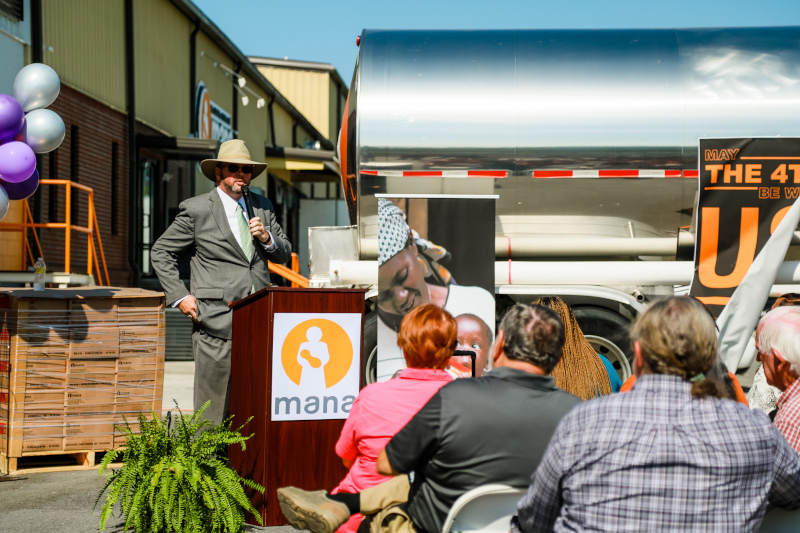
Mayor Jason Holt speaking at Mana Nutrition
Holt notes Fitzgerald’s reputation as a retirement community.
“We have a lot of people that leave here and go make their lives and come back here to retire,” he says. “I know that, because I’m in the funeral business, and this is where they come home to, which is nice, and we love that, but to have this younger generation of newly married couples coming back and contributing to our community is what’s going to help us going forward.”
“These are people that could work anywhere in the world,” Dunn concurs. “They have the qualifications to work for the small business owner or the Fortune 500 company. They could travel and work anywhere in the world, and yet they have chosen to live and work out of Fitzgerald.”
Holt cites a grant (a bit more than $1 million) from the Georgia Department of Transportation that’s helping Fitzgerald revitalize seven of its downtown parks and facilitate more walking and cycling opportunities. He points out that Fitzgerald, rather like Savannah, was designed as a city of squares.
“Main Street and Central, which are the two main arteries north, south, east and west, have median parks in between the opposing lanes,” he says, “and those parks were intended for leisure and walkability when they were landscaped and planned in the 1930s. They had fallen somewhat into disrepair, and different administrations over the years had done different things with them.”
As with most small cities in Georgia, Fitzgerald’s downtown area is a big local focus. Holt cites boutiques, stores, coffee shops, and more. A revitalization plan is in place to improve the downtown and make it even better.
The City of Fitzgerald is working in collaborative efforts with the development authority to improve things by repurposing blighted properties. Many downtown locations have ceased functioning as retail stores and have since become used simply for storage, as Holt reveals.
“The people that own them now are not shopkeepers,” he says, “and they just don’t have a plan. One of our focuses is: ‘Can we find somewhere else to store your treasures, and let us have that building to put something in it and be productive?’ We’re kicking that off and having some success.”
Resurgence of Industrial Growth
For a community of its size, Fitzgerald punches well above its weight as an industrial hot bed. According to Dunn, recent growth from Golden Boy Foods, Modern Dispersions, Mana Nutrition, West Fraser Lumber Company, Millex, and Polar Beverages total nearly a quarter-billion dollars in expected capital investment to be made in the community. This growth has brought on significant growth in the county’s GDP, reduced unemployment by 50%, and brought with it an increase in personal income growth.
What does the mean for the community? Dunn says the growth has pushed us to make multi-million-dollar investments in critical infrastructure. Currently Fitzgerald Utilities is expanding a community owned processed water treatment system that is partially funded by ARPA funds. Couple this with the recent announcement of a 50-acre GRAD (Georgia Ready for Accelerated Development) site and the community is poised to handle additional industrial growth.
Residential and business development
Dunn acknowledges that Fitzgerald is experiencing the same housing struggles as the rest of the nation.
“Right now,” he points out, “supply is limited. We are working on a housing plan in partnership with Georgia Tech’s Center for Economic Research and hope to be able to pursue some of the Georgia Rural Housing Initiative funds that will be available in the near future.”
Dunn also points out that the City is working in partnership with the University of Georgia at Athens (“Go, Dawgs!”). How? It’s the PROPEL program. The acronym stands for “planning rural opportunities for prosperity and economic leadership.”
“We’ve identified four focal points to do some strategic planning and economic development,” says Dunn, “and those are leadership, internal marketing, entrepreneurship, and corridor revitalization.
“With the corridor revitalization, we’re looking at opportunities at revitalizing some commercial properties on the Sherman and Grant Streets corridors. What we plan on doing is creating some new opportunities through the revitalization of some real estate and then also through some entrepreneurial efforts we are moving forward with.”
One of those opportunities is FLEX. This stands for “foundational leadership and entrepreneurial experience.” FLEX is a collaboration between our Chamber of Commerce, College and Career Academy, and Development Authority assisting high school students to help them start their own businesses, as Dunn informs.
This effort has now evolved into what officials are calling the Georgia FLEX program, which is a statewide initiative to do the same thing. As Dunn explicates, both the local and state-level competitions culminate in a “Shark Tank”-style presentation. Participating young entrepreneurs can win up to $5,000 or even as much as $10,000 dollars to put into their business efforts.
What kind of businesses does Fitzgerald want to attract to its downtown and commercial corridors? Mainly entrepreneurial endeavors, says Holt.
“That works best in small communities like ours,” he says, “if you look at the history of Fitzgerald and some of the entrepreneurs that have made an impact on this community.”
Holt cites such business leaders as Allen Conger, the president of Protein Plus, who also heads up the Allen and Carolyn Conger Foundation, a noted local philanthropic organization. Holt also brings up Gerald Pryor, who founded the Video Warehouse chain.
Today Pryor, heads up Covered Wagon Trailer company in Fitzgerald, one of the nation’s largest manufacturers of enclosed cargo trailers.
Then there’s Ron Paulk who invented a machine that inverts peanuts and thus revolutionized harvesting peanuts in southern Georgia. These efforts also led to the founding of Colony Bank, whose corporate headquarters are proudly in downtown Fitzgerald.
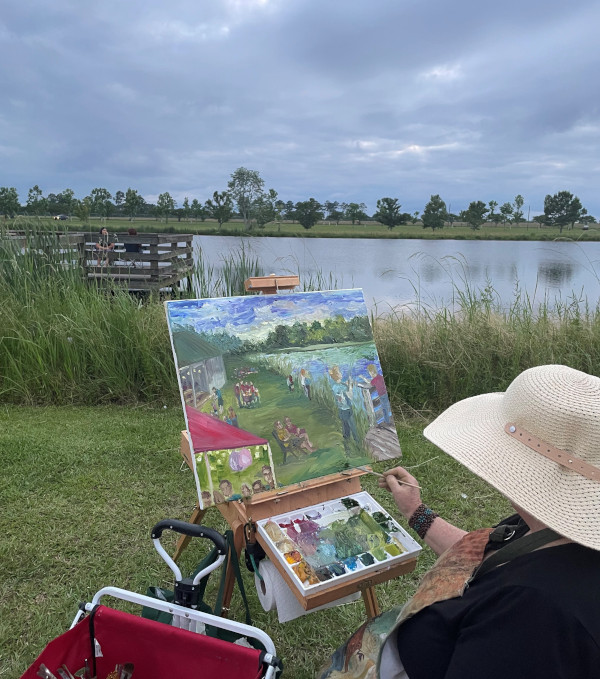 Tourism and arts
Tourism and arts
Young says Fitzgerald has a very strong and active tourism, arts, and cultural department. This includes a historic, renovated cinema downtown that plays first-run movies.
“It also hosts concerts and on-stage theatrical performances and so forth,” Young adds.
“We have an art studio that does classes for children, youth, and adults. Also, our Carnegie
Center hosts numerous events as well that are arts and tourism-related.
We do have tours that take place that show our architectural designs of houses and buildings. We also have a cemetery tour that is available. We have a great museum that is available for the public to enjoy.”
That would be the Blue and Gray Museum on Johnston Street. It’s dedicated to preserving the history of the Fitzgerald’s founding. Housed in a former railway station, it once served the Atlanta, Birmingham, and Atlantic rail line. At its core is a hall of honor that is dedicated to education about the leaders, both Union and Confederate alike, who established Fitzgerald as a community of brotherhood for the men of both the North and the South, 30 years after the War Between the States.
The museum also has a display honoring Raymond Davis, America’s most highly decorated member of the United States Marine Corps. A four-star general, Davis served in World War II and the Korean and Vietnam wars.
Young lauded the museum as the jewel in Fitzgerald’s crown.
“People travel to see our museum,” she says, “which has a lot of history in it. It has a little amphitheater inside to watch a video on how Fitzgerald was created. We do have a lot of events. You can check out our calendar, and it’s always full. We also have the Wild Chicken Festival (honoring a longtime symbol of the city), and we partner with the Jaycees for this. It happens annually. Of course, we do have a Fourth of July event. We just finished a Juneteenth event.”
“The list goes on and on, and it’s never-ending with things to do in Fitzgerald,” she concludes.
AT A GLANCE
Fitzgerald, Georgia
Where: about three hours west of Savannah
Website: www.fitzgeraldga.org
PREFERRED VENDORS
Southern Veneer – www.southernveneerproducts.com
Founded in 1998, Southern Veneer Products is one of the leading manufacturers of Southern Yellow Pine plywood, veneer, and wood by products in the southeastern United States. We serve an array of wholesale distributors across the United States. We are dedicated to providing a quality product that sets the standard for consistent and dependable service. Years of knowledgeable production and engineering expertise are merged with modern manufacturing techniques resulting in a superior product. Continuous improvement of practice and skill along with personal attention to our customers’ satisfaction are our primary goals. We take pride that our products are Made in the USA.
